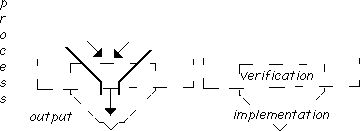
small
'Never do as others do'
Gurdjieff
Beelzebub's Tales to his Grandson

Minor details are often the source of major problems, as Gulliver finds out to his dismay. The same point is taken up by Robert Pirsig in his book Zen And The Art Of Motorcycle Maintenance. See also part 5, first entry. Often it is the minor details that break our necks in the stage of implementation. In an organism as big as an elephant a defective happening on a molecular level may cause a cancer and thus kill the animal. This may cause a discontinuous change (see crisis) although at first sight it may not be related at all. Analysis and groundwork must therefore always be considered at different levels.

It may also be those minor details which have our attention when we are looking for ideas. They may keep us from prospecting new vistas, because we know we don't have such or such a tool, or that it won't be possible anyway. Details should be given full attention during verification, they should never play a role during the stage of inventive search. However big they may be looming in our minds.
other aspects for implementation:
o How can we get people going, energise, develop interest, build the team?
o Planning: How can we break the work into manageable chunks that fit together successfully and minimise long-term cost?
o Estimating: What resources will we need, in what quantities, at what cost?
o Scheduling: When, and in what order, should we do things to minimise crises and wasted effort?
o Supplying and logistics: How do, we get the particular resources needed where they should be, when they should be: get rid of what is not needed: and avoid putting things that are not yet needed where they will get in the way?
o Negotiating: How do we agree with the people involved what they should do for us, and what we should do for them?
o Training: How can we make sure that people can do what we want them to do?
o Servicing: What about the practical human needs of those involved?
o Social support: And what about the personal needs of those involved?-emotional, social, developmental . . .
o Monitoring, recording and documenting: How do we keep track of what tasks have been completed, financial records, stock levels, outstanding problems, agreed decisions? What about legal records, quality control records, accident reports, training manuals, fault-finding guides, contracts, terms of reference, certificates, licences?
o Reviewing: Stepping back to see the overall state of play:-are we meeting targets, are problems emerging, do we need to redirect our resources?
o Maintaining: Once things have been set up, how can we keep them going?-machines, buildings, organisations, procedures-particularly when they have been in operation for a long time, and the initial enthusiasm and alertness has worn off.
o Evaluation: Stepping back even further. Is the system really doing what we thought it would do? Is it still the best way of doing it? Do we still need it at all?